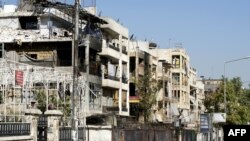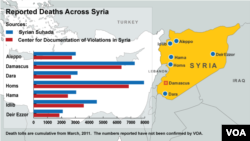LONDON —
An investigation into alleged war crimes in Syria will continue for at least six more months after the United Nations Human Rights Council condemned violations by government forces and rebel fighters.
The council's Commission of Inquiry (COI) says it is collecting a body of evidence that points to war crimes and crimes against humanity in Syria from both sides.
It blames government forces and militias aligned with them for the majority of abuses but also found abuses by rebel forces. It says it has detailed the names of individuals and units responsible for alleged crimes.
Seeking justice
The United States ambassador to the Human Rights Council, Eileen Chamberlain Donahoe, said it's critical that justice prevail.
"The work or the COI is important because as they continue to document the names of individuals responsible for these crimes and violations," she said. "They help ensure that this will not be a case where impunity prevails, but rather that those responsible for these crimes against the Syrian people will face justice and accountability."
Friday’s vote means the independent expert panel will have another six months to investigate abuses in Syria. The commission’s staff and resources are also set to be boosted.
The resolution was presented by Morocco and was supported by 41 member states. China, Russia, and Cuba opposed the resolution and three other members abstained.
Syria’s ambassador Faysal Khabbaz Hamoui rejected Friday’s resolution.
He says the draft resolution does not reflect the reality on the ground. It is based on accusations which are, in many cases he says, purely fictitious.
Panel investigators have been unable to enter Syria and have carried out their investigations in neighboring countries, including interviewing Syrian refugees.
Possible prosecutions
Nadim Shehadi, an expert on Syria at the London-based research group Chatham House, told VOA that the investigations could lead to prosecutions.
“It's very significant because the Human Rights Council is in a way a preparation for further international action, which would involve the International Criminal Court (ICC)," said Shehadi.
But Shehadi says the international community may not be ready to take what he calls that “final step” for international court intervention. He says that like Kofi Annan, the former U.N. envoy to Syria who resigned after failing to resolve the crisis, some in the international community still hope for productive dialogue.
"The final step to go to the ICC would signify to the regime that all lines of communication with it are now cut," he said. "There is no going back. There is no possibility of re-engagement with the regime. And I think that is the hesitation, because in the international policy there is still a residual of the 'Annan plan,' which is engagement with the regime and dialogue with the regime.”
Still, court involvement is complicated. Syria has never ratified a treaty that established the ICC.
The treaty does say that the U.N. Security Council can initiate an ICC investigation. But two of Syria’s allies, China and Russia, sit on the 15-member council and would have the power to veto an ICC investigation into alleged war crimes in Syria.
Both nations have blocked initiatives in the U.N. Security Council to further punish the Syrian regime over its 18-month-long crackdown on dissent and opposition forces.
The council's Commission of Inquiry (COI) says it is collecting a body of evidence that points to war crimes and crimes against humanity in Syria from both sides.
It blames government forces and militias aligned with them for the majority of abuses but also found abuses by rebel forces. It says it has detailed the names of individuals and units responsible for alleged crimes.
Seeking justice
The United States ambassador to the Human Rights Council, Eileen Chamberlain Donahoe, said it's critical that justice prevail.
"The work or the COI is important because as they continue to document the names of individuals responsible for these crimes and violations," she said. "They help ensure that this will not be a case where impunity prevails, but rather that those responsible for these crimes against the Syrian people will face justice and accountability."
Friday’s vote means the independent expert panel will have another six months to investigate abuses in Syria. The commission’s staff and resources are also set to be boosted.
The resolution was presented by Morocco and was supported by 41 member states. China, Russia, and Cuba opposed the resolution and three other members abstained.
Syria’s ambassador Faysal Khabbaz Hamoui rejected Friday’s resolution.
He says the draft resolution does not reflect the reality on the ground. It is based on accusations which are, in many cases he says, purely fictitious.
Panel investigators have been unable to enter Syria and have carried out their investigations in neighboring countries, including interviewing Syrian refugees.
Possible prosecutions
Nadim Shehadi, an expert on Syria at the London-based research group Chatham House, told VOA that the investigations could lead to prosecutions.
“It's very significant because the Human Rights Council is in a way a preparation for further international action, which would involve the International Criminal Court (ICC)," said Shehadi.
But Shehadi says the international community may not be ready to take what he calls that “final step” for international court intervention. He says that like Kofi Annan, the former U.N. envoy to Syria who resigned after failing to resolve the crisis, some in the international community still hope for productive dialogue.
"The final step to go to the ICC would signify to the regime that all lines of communication with it are now cut," he said. "There is no going back. There is no possibility of re-engagement with the regime. And I think that is the hesitation, because in the international policy there is still a residual of the 'Annan plan,' which is engagement with the regime and dialogue with the regime.”
Still, court involvement is complicated. Syria has never ratified a treaty that established the ICC.
The treaty does say that the U.N. Security Council can initiate an ICC investigation. But two of Syria’s allies, China and Russia, sit on the 15-member council and would have the power to veto an ICC investigation into alleged war crimes in Syria.
Both nations have blocked initiatives in the U.N. Security Council to further punish the Syrian regime over its 18-month-long crackdown on dissent and opposition forces.






